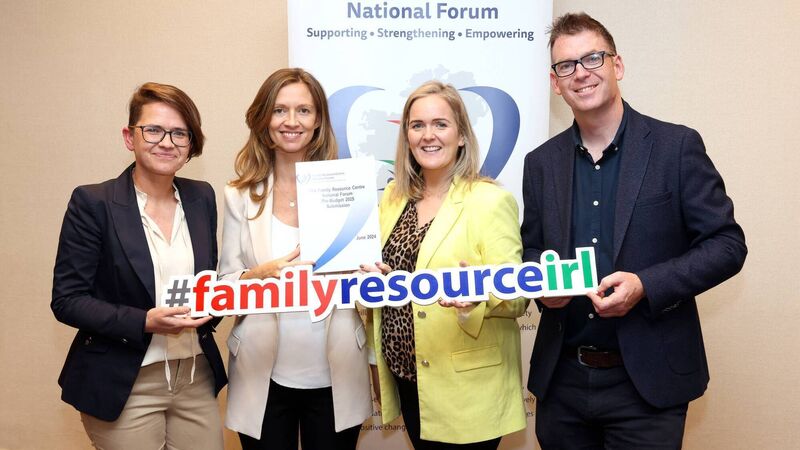Calls to support Family Resource Centres in Cork and nationwide

Photographed at the launch of the Family Resource Centre National Forum’s pre-Budget submission in Buswells Hotel were Justyna Doherty Trim FRC; Holly Cairns TD; Grace Kearney, Head of Health and Wellbeing, FRCNF; and Fergal Landy CEO of FRCNF.
As our government publishes its Summer Economic Statement outlining the size of Budget 2025, it needs to consider the impact an investment in our communities could have in real terms.
Naturally, there are many demands on government across housing, health, climate change targets and more. Amidst such demands, it is easy to lose sight of community.
So, what can government do to demonstrate its commitment to community? The Family Resource Centre National Form (FRCNF), the national representative body of all 121 Family Resource Centres in Ireland, is calling for a targeted and specific investment into the heart of communities. This is not instead of, but rather complements, the necessary spending on formal public services.
Family Resource Centres (FRCs) offer a way for government to invest in a programme that is nationally organised and coordinated but locally managed and delivered in partnership with the local community.
FRCs operate a human rights-based approach to community development and family support across all life stages. Investing in FRCs leads to direct and empowering support to everyone living in the 121 communities currently served by FRCs offering local impact for communities, whilst lessening the demand on public services.
Governments across the world tend to set up service responses around the symptoms that cause most problems for society. As a result, we get service responses for ill-health, both physical and mental, domestic violence, addiction, crime and so on.
Whilst these service responses are necessary and welcome, they will never be enough, and as late interventions with high thresholds to access, they are inevitably expensive and not always as effective as we would like.
Instead, there needs to be a concerted effort to address the root cause of such problems and prevent them leading to such symptoms. FRCs offer this preventative approach, by being locally accessible, welcoming and participatory environments, where children, families, individuals and communities can avail of the supports they need at the earliest opportunity in their life or at the outset of the challenge they are facing.
Families with babies and young children can draw on their FRCs for parenting and family support that may prevent them from being referred to child protection services. Children and young people can avail of supports like counselling, play therapy and other creative therapies to promote their emotional and social wellbeing potential avoiding the need for referral to HSE Child and Adolescent Mental Health Services (CAMHS).
Adults can avail of social prescribing, counselling and problem gambling support avoiding the need for referral to HSE mental health or addiction services.
Older people can avail of meals on wheels, support groups and home visiting ensuring they can live at home in their community for as long as possible rather than availing of costly nursing home care.
FRCs, through their community development approach, are committed to social inclusion and participation and always insist on understanding individuals and communities within their wider social context and involving them in challenging the status quo by co-creating their own solutions. As a result, FRCs such as the ones across Cork in Dunmanway, Bandon, Ballincollig, Cobh, Carrigtwohill, Midleton and Mallow are all about a sense of localism, place and belonging. They are also part of a national and international movement that refuses to accept the entirely avoidable situation of poverty, income inequality, and discrimination that creates the stressful context within which families and communities sometimes struggle to cope. It is only through a place-based approach to creating change, in partnership with communities, that these underlying causes can be addressed.
To do this vital work, the FRCNF has outlined to government the need for each of its members to have a minimum core level of funding from which to operate. This is €240,000 per FRC equating to €8 million nationally. This allows each FRC a base from which they can then build. It provides for salaries for core staff and basic operating costs. It may involve various community activities like setting up a men’s shed, a community garden, a knitting group or singing group. From there, FRCs will work with communities to leverage additional funding for specific areas of need that may exist in their community. In some instances, this additional support will be in the form of community-based childcare, parenting and family support, youth support and development activities, counselling and therapeutic supports, adult education, or support for older people in the community.
Budget 2025 is a key opportunity for government to maximise the potential of the national FRC programme to increase its capacity to deliver for children, families, individuals, and communities in Cork and throughout Ireland, and in doing so, provide additional supports to communities coping with many challenges such as the housing crisis, poverty, the cost of living, and integrating new communities and to support and empower those communities to address their challenges and maximise their potential.







 App?
App?




